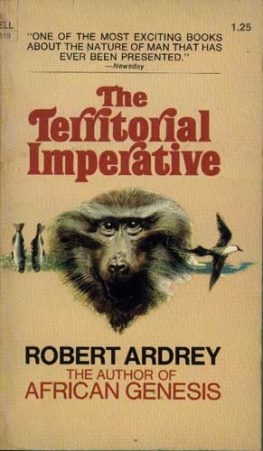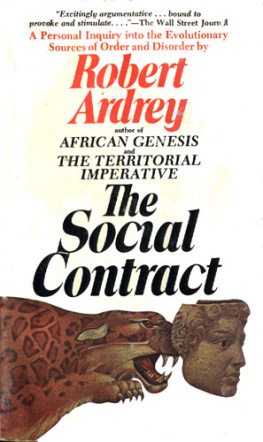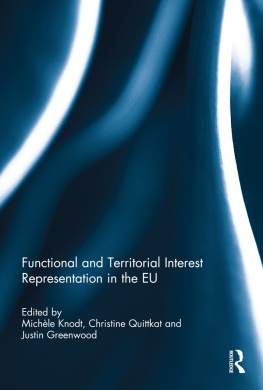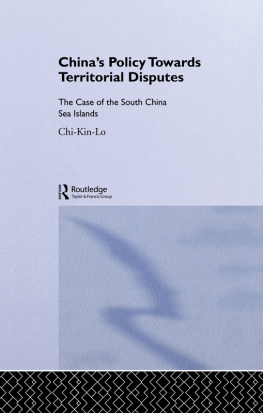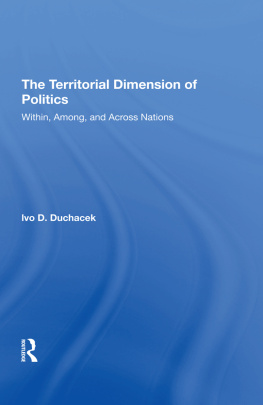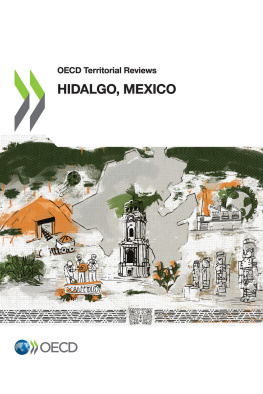Robert Ardrey - The Territorial Imperative
Here you can read online Robert Ardrey - The Territorial Imperative full text of the book (entire story) in english for free. Download pdf and epub, get meaning, cover and reviews about this ebook. year: 1966, genre: Detective and thriller. Description of the work, (preface) as well as reviews are available. Best literature library LitArk.com created for fans of good reading and offers a wide selection of genres:
Romance novel
Science fiction
Adventure
Detective
Science
History
Home and family
Prose
Art
Politics
Computer
Non-fiction
Religion
Business
Children
Humor
Choose a favorite category and find really read worthwhile books. Enjoy immersion in the world of imagination, feel the emotions of the characters or learn something new for yourself, make an fascinating discovery.
- Book:The Territorial Imperative
- Author:
- Genre:
- Year:1966
- Rating:3 / 5
- Favourites:Add to favourites
- Your mark:
- 60
- 1
- 2
- 3
- 4
- 5
The Territorial Imperative: summary, description and annotation
We offer to read an annotation, description, summary or preface (depends on what the author of the book "The Territorial Imperative" wrote himself). If you haven't found the necessary information about the book — write in the comments, we will try to find it.
The Territorial Imperative — read online for free the complete book (whole text) full work
Below is the text of the book, divided by pages. System saving the place of the last page read, allows you to conveniently read the book "The Territorial Imperative" online for free, without having to search again every time where you left off. Put a bookmark, and you can go to the page where you finished reading at any time.
Font size:
Interval:
Bookmark:
A territory is an area of space, whether of water or earth or air, which an animal or group of animals defends as an exclusive preserve. The word is also used to describe the inward compulsion in animate beings to possess and defend such a space. A territorial species of animals, therefore, is one in which all males, and sometimes females too, bear an inherent drive to gain and defend an exclusive property.
In most but not all territorial species, defense is directed only against fellow members of the kind. A squirrel does not regard a mouse as a trespasser. In most but not all territorial species -- not in chameleons, for example -- the female is sexually unresponsive to an unpropertied male. As a general pattern of behavior, in territorial species the competition between males which we formerly believed was one for the possession of females is in truth for possession of property.
We may also say that in all territorial species, without exception, possession of a territory lends enhanced energy to the proprietor. Students of animal behavior cannot agree as to why this should be, but the challenger is almost invariably defeated, the intruder expelled. In part, there, seems some mysterious flow of energy and resolve which invests a proprietor on his home grounds. But likewise, so marked is the inhibition lying on the intruder, so evident his sense of trespass, we may be permitted to wonder if in all territorial species there does not exist, more profound than simple learning, some universal recognition of territorial rights.
The concept of territory as a genetically determined form of behavior in many species is today accepted beyond question in the biological sciences. But so recently have our observations been made and our conclusions formed that we have yet to explore the implications of territory in [4] our estimates of man. Is Homo sapiens a territorial species? Do we stake out property, chase off trespassers, defend our countries because we are sapient, or because we are animals? Because we choose, or because we must? Do certain laws of territorial behavior apply as rigorously in the affairs of men as in the affairs of chipmunks? That is the principal concern of this inquiry, and it is a matter of considerable concern, I believe, to any valid understanding of our nature. But it is a problem to be weighed in terms of present knowledge, not past.
How recently our information about animal territory has come to us is very well illustrated by reflections recorded only thirty years ago by the anthropologist Julian H. Steward, now of the University of Illinois. "Why are human beings the only animals having land-owning groups?" he wondered. And he brought together observations "of twenty-four different hunting peoples so primitive that their ways differ little, in all probability, from the ways of paleolithic man. Their homes were isolated and far-spread -- in Philippine and Congo forests, in Tasmania and Tierra del Fuego, in Canada's Mackenzie basin, in the Indian Ocean's Andaman Islands, in southwestern Africa's Kalahari Desert. So remote were they from each other that there seemed small likelihood that any one could have learned its ways from others. Yet all formed social bands occupying exclusive, permanent domains.
How could it be that such a number of peoples in such varying environments so remote from each other should all form similar social groups based on what would seem to be a human invention, the ownership of land? Steward came to a variety of conclusions, but one line of speculation was denied him. Even in 1936 he could not know that his assumption was false, since many animals form land-owning groups. Lions, eagles, wolves, great-horned owls are all hunters, and all guard exclusive hunting territories. The lions and wolves, besides, hunt in cooperative prides and packs differing little from the bands of primitive man. Ownership of land is scarcely a human invention, as our territorial propensity is something less than a human distinction.
Man, I shall attempt to demonstrate in this inquiry, is as much a territorial animal as is a mockingbird singing in the clear California night. We act as we do for reasons of our [5] evolutionary past, not our cultural present, and our behavior is as much a mark of our species as is the shape of a human thigh bone or the configuration of nerves in a corner of the human brain. If we defend the title to our land or the sovereignty of our country, we do it for reasons no different, no less innate, no less ineradicable, than do lower animals. The dog barking at you from behind his master's fence acts for a motive indistinguishable from that of his master when the fence was built.
Neither are men and dogs and mockingbirds uncommon creatures in the natural world. Ring-tailed lemurs and great-crested grebes, prairie dogs, robins, tigers, muskrats, meadow warblers and Atlantic salmon, fence lizards, flat lizards, three-spined sticklebacks, nightingales and Norway rats, herring gulls and callicebus monkeys -- all of us will give everything we are for a place of our own. Territory, in the evolving world of animals, is a force perhaps older than sex.
The survival value that territory brings to a species varies as widely as do the opportunities of species themselves. In some it offers security from the predator, in others security of food supply. In some its chief value seems the selection of worthy males for reproduction, in some the welding together of a group, and in many, like sea birds, the prime value seems simply the excitement and stimulation of border quarrels. And there are many species, of course, for which the territorial tie would be a handicap to survival. Grazing animals for the most part must move with the season's grass. Elephant herds acknowledge no territorial bond, but move like fleets of old gray galleons across the measureless African space. The gorilla, too, is a wanderer within a limited range who every night must build a new nest wherever his search for food may take him.
In those countless species, however, which through long evolutionary trial and error have come to incorporate a territorial pattern into their whole behavior complex, we shall find a remarkable uniformity. Widely unrelated though the species may be, a few distinct patterns are endlessly repeated. In the next chapter, for example, we shall examine arena behavior, in which solitary males defend mating stations to which females come solely for copulation. It makes little difference whether the species be antelope or sage grouse, the pattern will be almost the same. And in the [6] chapter after that we shall consider the pair territory, that portion of space occupied and defended by a breeding couple, as in robins and beavers and men. So we shall move along, surveying the territorial experience in the world of the animal as it has been observed by science in our generation.
It is information, all of it, which failed to enter your education and mine because it had not yet come to light. It is information, all of it, which yet fails to enter our children's textbooks or the processes of our own thought, through nothing but neglect. To me, this neglect seems a luxury which we cannot afford. Were we in a position to regard our knowledge of man as adequate in our negotiations with the human circumstance, and to look with satisfaction on our successful treatment of such human maladies as crime and war, racial antagonisms and social loneliness, then we might embrace the world of the animal simply to enjoy its intrinsic fascinations. But I find no evidence to support such self-satisfaction. And so this wealth of information concerning animal ways, placed before us by the new biology, must be regarded as a windfall in a time of human need.
If, as I believe, man's innumerable territorial expressions are human responses to an imperative lying with equal force on mockingbirds and men, then human self-estimate is due for radical revision. We acknowledge a few such almighty forces, but very few: the will to survive, the sexual impulse, the tie, perhaps, between mother and infant. It has been our inadequate knowledge of the natural world, I suggest, that has led us to look no further. And it may come to us as the strangest of thoughts that the bond between a man and the soil he walks on should be more powerful than his bond with the woman he sleeps with. Even so, in a rough, preliminary way we may test the supposition with a single question: How many men have you known of, in your lifetime, who died for their country? And how many for a woman?
Font size:
Interval:
Bookmark:
Similar books «The Territorial Imperative»
Look at similar books to The Territorial Imperative. We have selected literature similar in name and meaning in the hope of providing readers with more options to find new, interesting, not yet read works.
Discussion, reviews of the book The Territorial Imperative and just readers' own opinions. Leave your comments, write what you think about the work, its meaning or the main characters. Specify what exactly you liked and what you didn't like, and why you think so.

